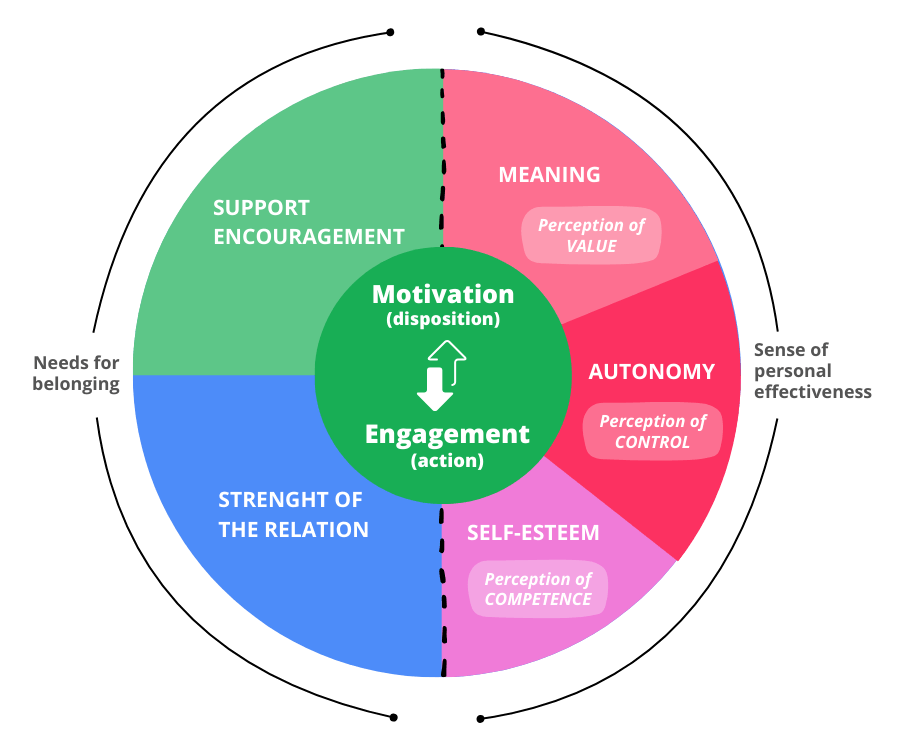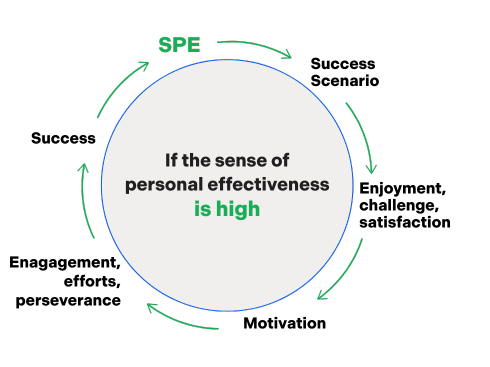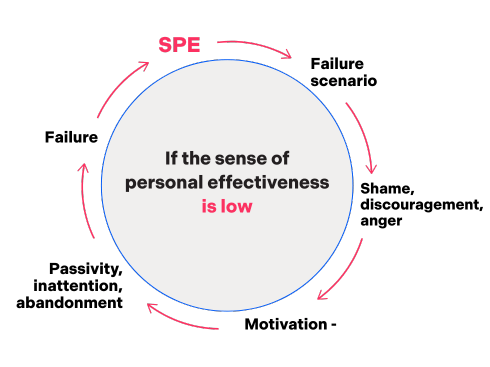

Motivation is the force that pushes you towards action.
Engagement is the decision to take part in something.
A motivated student is ready to be engaged and provide efforts.
Possible results of these efforts:


*This image was created in 2022 by RAP Côte-Nord, in collaboration with the Centre de transfert pour la réussite éducative du Québec (CTREQ). The objective was to document the member partners of our School perseverance project, in order to better act on academic motivation (search for meaning and development of aspirations) in teenagers aged 12 years and older, and to support their parents so they are better equipped to motivate their children.
To read the whole content, as well as the final report, visit the Initiatives and effective tools to promote school motivation page.
For this specific initiative, we have focused on the following motivational factors:
Autonomy
“Autonomy refers, for young people, to the ability to decide the actions they take, to make their own decisions according to their preferences or interests, and to be able to act on their environment. Autonomy is a fundamental psychological need of individuals.” (CTREQ, 2017)
Feeling of competence
“The feeling of competence refers to individuals’ perception of their own skills, and confidence in their ability to succeed in a specific kind of activity. To develop their feeling of competence, young people will usually judge themselves based on their history of success or failure, and on the opinion of significant people in their lives. Therefore, when they have opportunities to experience success and to be encouraged by their parents, their friends, animators […], they have a higher chance of feeling competent.” (CTREQ, 2017)
This means that the feeling of competence is closely linked to the next factor, offering various and regular opportunities to experience success.
Probability of success
Holding positive and optimistic expectations towards a child encourages them to create strategies and to set objectives that help them meet these expectations. (Mahler, 2018)
Also, positive feedback activates parts of our brain that trigger a feeling of pleasure and well-being that contributes to motivation.
Success → Positive feedback → Activation of the striatum → Increase in dopamine → Feeling of pleasure and satisfaction → Increase or sustainment of motivation
(Masson, 2021)
Therefore, to foster this virtuous cycle, it is important to:
You should know!
Promising a reward if the student completes an objective does not have the same effect on motivation as offering spontaneous and unexpected positive feedback. A promised reward can have a negative impact on motivation because it does not encourage the internalization of the behaviour (Fréchette-Simard, 2019). What this means is that the student chooses to adopt a behaviour because they want to get the reward. If the reward stops being offered, they might not see the point of keeping up with their positive behaviour.
Positive feedback should therefore focus on:
Sense of social belonging
“Social belonging refers to the quality of the relationships that young people have with significant people (parents, friends, teachers, animators, etc.). Relationships characterized by proximity, emotional support and a feeling of safety are associated with self-determined motivation in a variety of contexts.” (CTREQ, 2017)
Interest
Interest can either be situational or individual.
“Situational interest is defined as the temporary attention that young people will pay to a type of content” or a particular activity. “This psychological state of interest, which is often triggered by environmental stimuli, is generally unstable in that it may be long-lasting just as well as it may not be.”
“Individual interest, on the other hand, is a predisposition (generally stable) to get immersed in a type of content” or a particular activity. (CTREQ, 2017)

It is the perception of future events that is a source of motivation and behavioural regulation. We have a higher chance of succeeding if we believe we can succeed. Therefore, it is essential that adults and counselors who work with children believe that they have what it takes to succeed, and that they offer adapted activities that these children have the means to succeed in.
Implementing adapted initiatives will increase the sense of personal effectiveness (SPE).


Source : Thérèse Bouffard’s conference (2010-2011), Le sentiment d’efficacité personnelle de l’élève. Taken from : St-Pierre, M. (2013). « Fiche 10 Motivation et engagement » Fiches pratiques Les déterminants de la persévérance scolaire et de la réussite éducative, Réunir Réussir.

Self-determination
First, let’s talk about self-determination. A self-determined behaviour is characterized by the ability of a person to self-regulate and adopt autonomous behaviours (Field et al., 1998). As such, a self-determined person chooses and controls their behaviours: their actions are guided by their own choices, needs, desires and values, and not by external pressure. (CTREQ, 2023)
Self-determination is like a small compass everyone has inside of ourselves, that indicates if we’re on the right track to developing our full potential.
Frédéric Guay, Chaire de recherche du Canada en motivation, persévérance et réussite scolaires, Université Laval, https://www.taalecole.ca/motivation
🛈The level of self-determination for each type of motivation is represented by an icon, going from low to high (1 to 5) ![]()
Extrinsic motivation
Refers to learning behaviours that were adopted to obtain a reward or avoid punishment. The benefits are not associated with the activity.
3 kinds:
Intrinsic motivation
![]()
Defined by the pleasure and satisfaction the student feels towards what they are learning. They develop an interest for the activity.
Other benefits: creativity, better performance, proper use of the strategies taught to them, school perseverance, etc.
Lack of motivation
![]()
In this motivational state, the student does not see any good reason to take part in school activities. This state can come from a lack of interest for school or a feeling of incompetence.
Observation: Absences, lateness, avoidance, inappropriate behaviour
The student:


